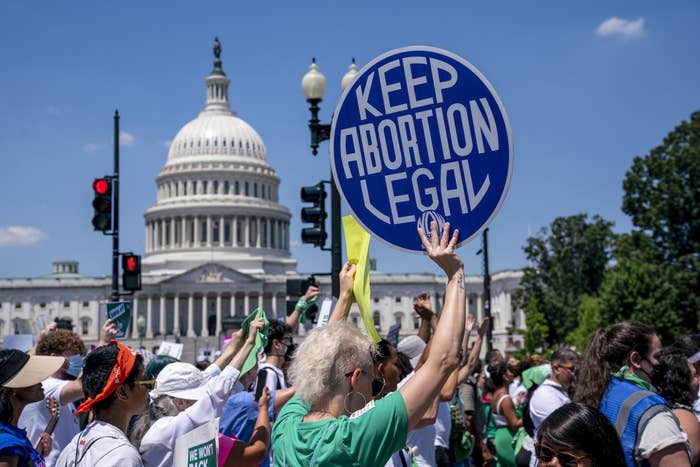
For decades, anti-abortion lawmakers in Florida have had little success restricting access to abortion due to a right to privacy clause in the state’s constitution that its highest court — and voters — have said protects the right to the medical procedure.
That language is once again at the center of a lawsuit seeking to stop the state from banning abortion at 15 weeks now that the Supreme Court has given states the green light to legislate the issue locally with its decision overturning Roe v. Wade, the landmark 1973 opinion that legalized abortion nationwide.
And as the legal battle over abortion rights shifts to the states, attorneys for abortion providers are relying on similar arguments that state constitutions protect a right to privacy and that the right to abortion is part of that in lawsuits against jurisdictions that have moved swiftly to ban the procedure outright or early in pregnancy.
“[Privacy rights are] really embedded because the right to make decisions about your body and your life is fundamental to ordered government and that's what a constitution is,” said Amy Myrick, senior staff attorney on judicial strategy at the Center for Reproductive Rights.
As of Tuesday, the center, the ACLU, and Planned Parenthood have filed legal challenges in 11 states to block the enforcement of bans in a post-Roe world. Of those cases, at least six, including in Mississippi, Kentucky, and Idaho, incorporate arguments that the bans enacted or expected to take effect violate people’s right to privacy, whether that right is explicit or inferred by the courts. So far, courts have temporarily blocked bans in Louisiana, Kentucky, and Utah, allowing clinics in those areas to resume providing abortion care — for now. Trial courts also temporarily restrained Texas and Florida from enforcing their bans on abortion, but those orders have since been suspended on appeal.
As in Roe, where the Supreme Court determined that although the right to privacy is not listed in the US Constitution, it is implied and protects the right to abortion, courts in some states have interpreted their constitutions as protecting the right to privacy, experts told BuzzFeed News. And that protection is typically much broader at the state level than at the federal level.
“The federal constitution is a floor but it’s not a ceiling, and state constitutions can and often do provide greater protection for their citizens,” said Alexa Kolbi-Molinas, deputy director of the ACLU Reproductive Freedom Project.
For example, the Mississippi Supreme Court in 1998 reaffirmed an earlier decision that stated, “no aspects of life is more personal and private than those having to do with one's sexual organs and reproductive system,” and held that “the state constitutional right to privacy includes an implied right to choose whether or not to have an abortion.” That opinion “very clearly confirms that the Mississippi Constitution independently protects the right to abortion,” said Hillary Schneller, senior staff attorney at the Center for Reproductive Rights, which is representing Jackson Women’s Health Organization in a lawsuit challenging the state’s so-called trigger law that outlaws nearly all abortions, as well as a law prohibiting the procedure at six weeks of pregnancy.
Neither ban has yet been enforced, allowing Jackson Women’s Health, the state’s only remaining abortion clinic and the provider at the center of the case that led to Roe’s fall, to continue providing care before 15 weeks of pregnancy.
“Our goal in this case is to buy every hour, every day, for them to be able to continue to do that,” Schneller said. “Every day the clinic is able to stay open and provide abortion services protects the health and lives of Missippians and we hope to be able to secure that for as long as possible.”
The idea to enshrine privacy protections gained steam in the 1970s — around the time that Roe was decided — due to a variety of concerns about invasions of people’s privacy, including digital privacy issues.
“This was an era in which both there was sort of early digitization and abuse of digitization,” said Mary Ziegler, a professor of law at the University of California, Davis, and an expert on the legal history of reproductive rights.
In Montana and Alaska, which considered privacy rights during constitutional conventions, some delegates discussed abortion as being part of a broad right to privacy that encompassed both private decision-making and privacy around records and technology, Myrick said. But in other states like Florida, which passed a constitutional amendment guaranteeing the right to privacy in 1980, it wasn’t clear whether the measures were designed to protect abortion.
“The debate in 1980 didn’t really talk about abortion a lot,” Ziegler said, referring to the Florida amendment. “It also wasn’t clearly not about abortion.”
Because of Roe, voters theoretically would have known at the time that abortion was identified with a right to privacy as the state Supreme Court noted in previous rulings on the issue. And in 2012, Florida voters rejected a ballot measure that sought to exclude abortion from the state’s constitutional right to privacy.
Still, Gov. Ron DeSantis has continued to argue that Florida’s right to privacy does not protect abortion. After a circuit court judge said last week that he would issue an order blocking the state’s 15-week ban, DeSantis vowed to ask the Florida Supreme Court to overrule its precedent. “The struggle for life is not over,” his office said.

In addition to Montana, Alaska, and Florida, courts in California, Massachusetts, Minnesota, and New Jersey have interpreted their state constitutional right to privacy as protecting access to abortion, according to the Center for Reproductive Rights. Several other states, including Arizona, South Carolina, and Louisiana, have explicit rights to privacy in their constitutions but their highest courts have not yet ruled on whether it includes abortion, Myrick said.
In legal challenges filed in the wake of Roe’s downfall, attorneys for abortion providers are also relying on equal protection and inherent rights clauses to argue that the abortion bans violate state constitutions. Other cases are focused on claims that states’ abortion laws are so vague that it’s unclear what conduct they prohibit, what exceptions are allowed, and what penalties would be in force.
“State constitutions are really innovative and varied and they come from all different time periods, but every single one has rights that protect the right to abortion if read correctly by the state courts,” Myrick said. “The question is whether courts will view them that way.”
Despite the strong protections in state constitutions and case law, state courts could still buck their own precedents, as the Supreme Court did, in favor of anti-abortion lawmakers and activists. Days before Roe was struck down, the Iowa Supreme Court reversed its own 2018 ruling protecting abortion. That decision came after the court’s membership grew more conservative, with four appointees by Republican Gov. Kim Reynolds, who opposes abortion.
“There will be enormous pressure” on state courts to uphold abortion bans, Myrick said. “Whether courts will remain independent is yet to be seen.”
It will likely depend on the makeup of the benches, but it’s still possible that even more conservative courts could rule in favor of abortion rights, said Aziza Ahmed, a professor of law at the University of California, Irvine.
“They might think that the Supreme Court has gone too far, or they might disagree with how this is all playing out,” Ahmed said.
She added that she could see judges who personally might be against abortion uphold protections for the sake of “institutional credibility,” as some court observers thought Supreme Court Chief Justice John Roberts might do in the case that overruled Roe (he did not).
“It’s worth trying, in any case,” Ahmed said.
These questions about whether the courts will interpret state constitutions as protecting abortion rights probably won’t be settled anytime soon.
“This is going to be an ongoing struggle because there will be a fight to control state supreme courts,” just as there is for the nation’s highest court, Ziegler said.
Even if a state constitutional challenge fails in the coming months, that won’t mean that “it would fail forever,” she said.
“Whatever we see in the short term may not be lasting,” Ziegler said.
Which goes to show that relying on the courts won’t be enough to protect and restore nationwide access to abortion now or down the road.
“We are going to continue to try to preserve access and expand access to abortion for as many people as possible for as long as possible,” Kolbi-Molinas said. “But we also know that the courts are not going to save us here and we have to shift power from the courts to the people.”
